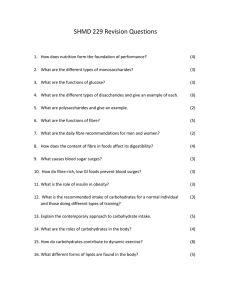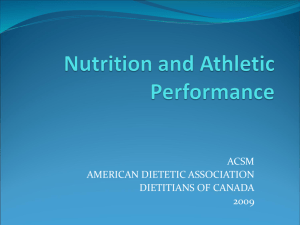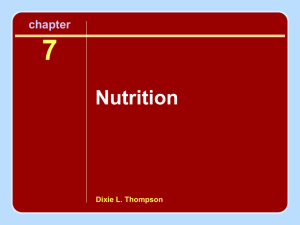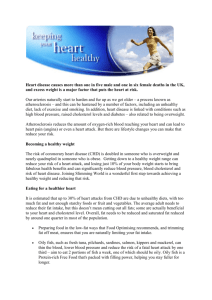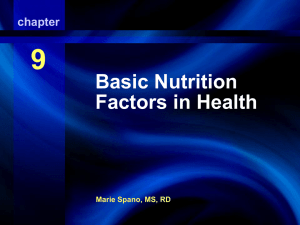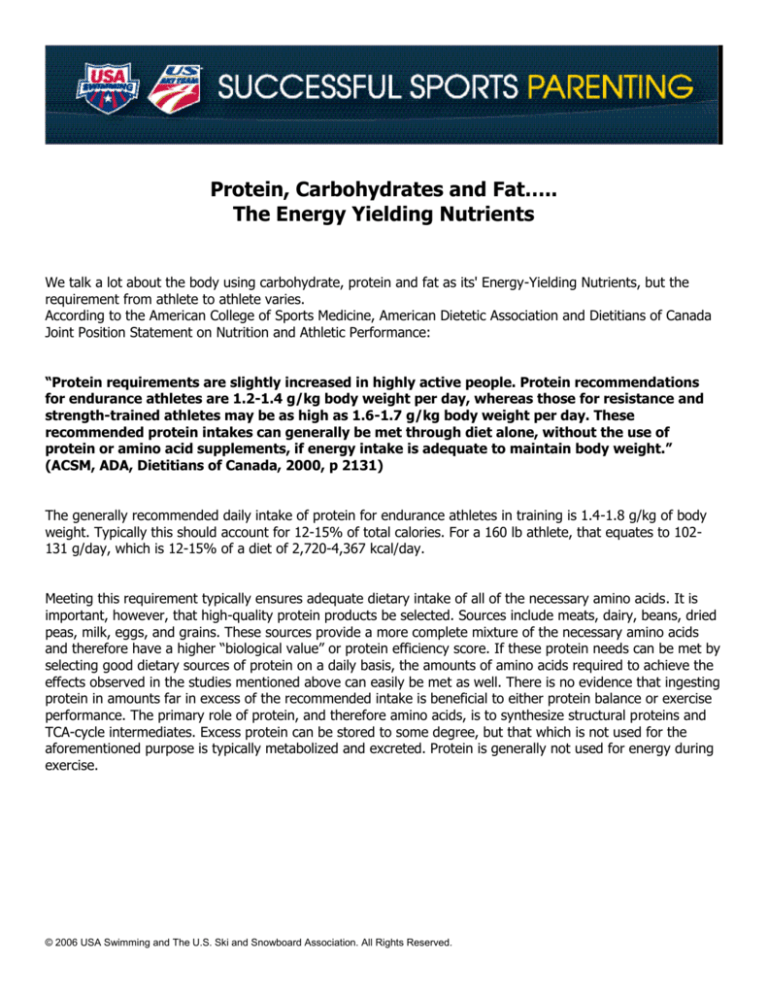
Pr
ot
ei
n,Car
bohydr
at
esandFat
….
.
The Energy Yielding Nutrients
We talk a lot about the body using carbohydrate, protein and fat as its' Energy-Yielding Nutrients, but the
requirement from athlete to athlete varies.
According to the American College of Sports Medicine, American Dietetic Association and Dietitians of Canada
Joint Position Statement on Nutrition and Athletic Performance:
“
Pr
ot
ei
nr
equi
r
ement
sar
esl
i
ght
l
yi
ncr
easedi
nhi
ghl
yact
i
vepeopl
e.Pr
ot
ei
nr
ecommendat
i
ons
for endurance athletes are 1.2-1.4 g/kg body weight per day, whereas those for resistance and
strength-trained athletes may be as high as 1.6-1.7 g/kg body weight per day. These
recommended protein intakes can generally be met through diet alone, without the use of
protein or ami
noaci
dsuppl
ement
s,i
fener
gyi
nt
akei
sadequat
et
omai
nt
ai
nbodywei
ght
.
”
(ACSM, ADA, Dietitians of Canada, 2000, p 2131)
The generally recommended daily intake of protein for endurance athletes in training is 1.4-1.8 g/kg of body
weight. Typically this should account for 12-15% of total calories. For a 160 lb athlete, that equates to 102131 g/day, which is 12-15% of a diet of 2,720-4,367 kcal/day.
Meeting this requirement typically ensures adequate dietary intake of all of the necessary amino acids. It is
important, however, that high-quality protein products be selected. Sources include meats, dairy, beans, dried
peas, milk, eggs, and grains. These sources provide a more complete mixture of the necessary amino acids
andt
her
ef
or
ehaveahi
gher“
bi
ol
ogi
c
alval
ue”orpr
ot
ei
nef
f
i
c
i
enc
ys
c
or
e.I
ft
hes
epr
ot
ei
nneedsc
anbemetby
selecting good dietary sources of protein on a daily basis, the amounts of amino acids required to achieve the
effects observed in the studies mentioned above can easily be met as well. There is no evidence that ingesting
protein in amounts far in excess of the recommended intake is beneficial to either protein balance or exercise
performance. The primary role of protein, and therefore amino acids, is to synthesize structural proteins and
TCA-cycle intermediates. Excess protein can be stored to some degree, but that which is not used for the
aforementioned purpose is typically metabolized and excreted. Protein is generally not used for energy during
exercise.
© 2006 USA Swimming and The U.S. Ski and Snowboard Association. All Rights Reserved.
Body Weight in
lbs (kg)
120
130
140
150
(54.5)
(59.1)
(63.6)
(68.2)
160 (72.7)
170 (77.3)
180 (81.8)
190 (86.4)
200 (90.9)
210 (95.5)
220 (100.0)
Carbohydrate
Required (g) to
meet Intake of 9
g/kg
491
532
572
614
655
695
736
777
818
859
900
Carbohydrate
Required (g) to meet
Intake of 10 g/kg
545
590
636
682
727
773
818
864
909
955
1,000
Protein Required
Protein Required
(g) to meet
(g) to meet Intake
Intake of 1.4
of 1.8 g/kg
g/kg
76
98
83
106
89
115
95
123
102
108
115
121
127
134
140
131
139
147
155
164
172
180
The American College of Sports Medicine, American Dietetic Association and Dietitians of Canada Joint Position
Statement on Nutrition and Athletic Performance also states:
“
Car
bohydr
at
esar
ei
mpor
t
antt
omai
nt
ai
nbl
ood-glucose levels during exercise and to replace
muscle glycogen. Recommendations for athletes range from 6 to 10 g/kg body weight per day.
Theamountr
equi
r
eddependsupont
heat
hl
et
e’
st
ot
aldai
l
yener
gyexpendi
t
ur
e,t
ypeofspor
t
performed, sex of the athlete, and environmental conditions.
”(
ACSM,ADA,Di
et
i
t
i
ansofCanada,
2000, p 2131)
The general recommendation is that carbohydrate intake should account for at least 60% of total caloric
intake. In addition, long-supported research by Costill (1988) indicates that athletes training more than 2
hrs/day require a carbohydrate intake of 9-10 g/kg of body weight on a daily basis to prevent chronic
depletion of carbohydrate stores.
Lastly, The American College of Sports Medicine, American Dietetic Association and Dietitians of Canada Joint
Position Statement on Nutrition and Athletic Performance also states:
“
Fati
nt
akeshoul
dnotber
est
r
i
ct
ed,becauset
her
ei
snoper
f
or
mancebenef
i
ti
nconsumi
ngadi
et
with less than 15% of energy from fat, compared with 20% to 25% of energy from fat. Fat is
important in the diets of athletes as it provides energy, fat-soluble vitamins, and essential fatty
acids. Additionally, there is no scientific basis on which to recommend high-f
atdi
et
st
oat
hl
et
es.
”
(ACSM, ADA, Dietitians of Canada, 2000, p 2131)
© 2006 USA Swimming and The U.S. Ski and Snowboard Association. All Rights Reserved.
The general recommendation is that endurance athletes get 20-25% of their calories from fat. For the athlete
whose daily caloric requirement is 2,000 kcal, this translates to 400-500 kcal from fat, or 44-56 grams of fat
per day. Use the following table to determine that amount of fat you should be consuming on a daily basis:
Total
Caloric
Need (kcal)
2,000
2,500
3,000
3,500
4,000
4,500
5,000
5,500
6,000
6,500
7,000
Daily Fat Intake (g)
To meet 20-25% of
this Caloric Intake
44-56
56-69
67-83
78-97
89-111
100-125
111-139
122-153
133-167
144-181
156-194
© 2006 USA Swimming and The U.S. Ski and Snowboard Association. All Rights Reserved.


